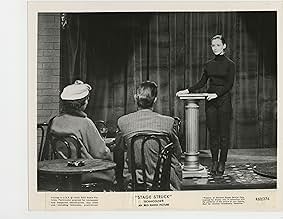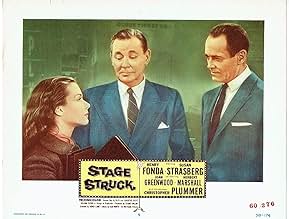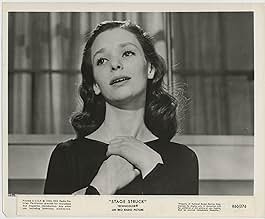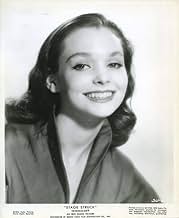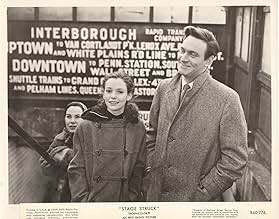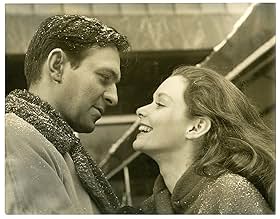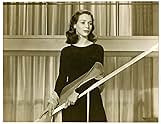AVALIAÇÃO DA IMDb
5,9/10
903
SUA AVALIAÇÃO
Uma jovem chega a Nova York determinada a tornar-se uma grande estrela teatral, mas descobre que seu objetivo pode não ser tão fácil de alcançar quanto ela esperava.Uma jovem chega a Nova York determinada a tornar-se uma grande estrela teatral, mas descobre que seu objetivo pode não ser tão fácil de alcançar quanto ela esperava.Uma jovem chega a Nova York determinada a tornar-se uma grande estrela teatral, mas descobre que seu objetivo pode não ser tão fácil de alcançar quanto ela esperava.
- Direção
- Roteiristas
- Artistas
Pat Harrington Sr.
- Benny
- (as Pat Harrington)
Pat Englund
- Gwen Hall
- (as Patricia Englund)
Merle A. Ashley
- Minor Role
- (não creditado)
Dario Barri
- Handsome Young Man
- (não creditado)
Rolly Bester
- Minor Role
- (não creditado)
Leon Bibb
- Guitar Player
- (não creditado)
- Direção
- Roteiristas
- Elenco e equipe completos
- Produção, bilheteria e muito mais no IMDbPro
Avaliações em destaque
Some people are born with talent. Some can acquire it. Others can take all the lessons in the world, and still not grasp that elusive "it". And that's the problem with Susan Strasberg's performance: she clearly understands the nuances and subtleties of acting, but cannot connect that knowledge to the empathy and passion an actor must have to be believable in their role.
When at the party, Eva Lovelace recites the balcony scene from "Romeo & Juliet", and the guests become transfixed, I was never sure if they were staring in awe or horror. Strasberg pauses and reflects on her words perfectly -- at these moments, one could believe she's Juliet watching and waiting for her lover's answers. But when she recites the words -- and a recitation is all it is -- the fire, the passion of Juliet for Romeo is non-existent. She could just as easily have been telling the doorman to call her a cab.
The most interesting aspect of the film was in watching the various methods of acting being presented. Herbert Marshall (who started in silents and early talkies), Henry Fonda (who started in film in the 1930s) and Christopher Plummer (one of the new method actors) are all believable in their roles and mesh seamlessly together. Then there's Strasberg, who is incapable of presenting even a fraction of the range of any of her co-stars. (Frankly, I didn't make the connection between her and her father, and wondered who she knew to have secured the role.) The film is interesting as a curio piece, and Lumet's brilliance in portraying New York's scenery. But as a moving story about the theatre, it can't touch "All About Eve".
When at the party, Eva Lovelace recites the balcony scene from "Romeo & Juliet", and the guests become transfixed, I was never sure if they were staring in awe or horror. Strasberg pauses and reflects on her words perfectly -- at these moments, one could believe she's Juliet watching and waiting for her lover's answers. But when she recites the words -- and a recitation is all it is -- the fire, the passion of Juliet for Romeo is non-existent. She could just as easily have been telling the doorman to call her a cab.
The most interesting aspect of the film was in watching the various methods of acting being presented. Herbert Marshall (who started in silents and early talkies), Henry Fonda (who started in film in the 1930s) and Christopher Plummer (one of the new method actors) are all believable in their roles and mesh seamlessly together. Then there's Strasberg, who is incapable of presenting even a fraction of the range of any of her co-stars. (Frankly, I didn't make the connection between her and her father, and wondered who she knew to have secured the role.) The film is interesting as a curio piece, and Lumet's brilliance in portraying New York's scenery. But as a moving story about the theatre, it can't touch "All About Eve".
Poor Susan Strasberg. She had not an easy life. She was so lovely. But her delivery in this movie - a remake of a Katharine Hepburn 30s vehicle called "Morning Glory" - is simply not good. It doesn't help that the script is a cliché of a cliché of a cliché, if there is such a thing. Henry Fonda does the best he can with the bad, hoary lines. The supporting cast of Joan Greenwood and Christopher Plummer are excellent and fascinating as usual, but they're stuck with bad lines. In Greenwood's case, bad lines complaining about bad lines!!! And even though Fonda is good, you can't believe Susan would really go for him.
The best thing about the movie is the scene backstage towards the end when the show that might make Strasberg a star, is just about to start. The movie's director shows the stagehands being called their cues by the stage manager, and you get the suspense of what it's like to be backstage just before the curtain goes up.
The stage manager by the way is played by Jack Weston, who played a stage manager the next year in Douglas Sirk's "Imitation of Life," which is also about "the theatuh," and in its complex phoniness and artificiality it rings truer than "Stage Struck." Beloved Herbert Marshall is also in this movie and you can see very easily that he is really walking on a wooden leg.
The street scenes of New York are interesting in this movie. Also interesting is the name of a Greenwich Village nightclub where Strasberg cringingly reads poetry and verse: The Village Voice!
The best thing about the movie is the scene backstage towards the end when the show that might make Strasberg a star, is just about to start. The movie's director shows the stagehands being called their cues by the stage manager, and you get the suspense of what it's like to be backstage just before the curtain goes up.
The stage manager by the way is played by Jack Weston, who played a stage manager the next year in Douglas Sirk's "Imitation of Life," which is also about "the theatuh," and in its complex phoniness and artificiality it rings truer than "Stage Struck." Beloved Herbert Marshall is also in this movie and you can see very easily that he is really walking on a wooden leg.
The street scenes of New York are interesting in this movie. Also interesting is the name of a Greenwich Village nightclub where Strasberg cringingly reads poetry and verse: The Village Voice!
Susan Strasburg was method acting guru Lee Strasburg's daughter.The film is peppered with acting luminaries such as Henry Fonda, Christopher Plummer and Herbert Marshall. I was however strongly reminded of a film on a rather similar theme "All about Eve" where again an ambitious young novice actress seeks to advance her career - at the expense of ageing actress played by Bette Davis. The screenplay by Joseph L. Mankiewicz has become immortal as in "Fasten your seatbelts, it's going to be a bumpy night! ".
Not one line of Stage Struck is memorable. My attention was only briefly attracted by something surely unintended around 30 minutes in. Strasburg, Fonda and Herbert Marshal perform part of a Shakespeare play. Henry Fonda was OK but Susan Strasburg quacked and gave no indication of promise even. But Herbert Marshall spoke his lines wonderfully. Marshal, I suddenly realised had wasted and misdirected his talents, not least here.
Interesting Herbert Marshall trivia: During the First World War, Marshall served ... with fellow actors Basil Rathbone, Ronald Colman, Cedric Hardwicke and Claude Rains. (Wikipedia) Coincidentally perhaps the greatest and most distinctive vocal talents in cinema history.
Not one line of Stage Struck is memorable. My attention was only briefly attracted by something surely unintended around 30 minutes in. Strasburg, Fonda and Herbert Marshal perform part of a Shakespeare play. Henry Fonda was OK but Susan Strasburg quacked and gave no indication of promise even. But Herbert Marshall spoke his lines wonderfully. Marshal, I suddenly realised had wasted and misdirected his talents, not least here.
Interesting Herbert Marshall trivia: During the First World War, Marshall served ... with fellow actors Basil Rathbone, Ronald Colman, Cedric Hardwicke and Claude Rains. (Wikipedia) Coincidentally perhaps the greatest and most distinctive vocal talents in cinema history.
As several reviewers have remarked, the chief attraction of Sidney Lumet's film lies in its evocation of New York in the mid-Fifties. From its opening tracking shots of Broadway, showing the popular shows of the time (including SEPARATE TABLES), to the regular establishing shots of the cars and taxicabs moving endlessly up and down, the film makes us aware of the fact that the action will take place in a confined location, wherein everyone knows everyone else.
In this kind of environment, egos are both fragile yet inflated. Joan Greenwood's Rita Vernon offers a prime example - someone who believes in her abilities as an "ACTOR," yet perpetually haunted by the belief that she could somehow lose her stardom. Hence her relentless pursuit of producer Lewis Easton (Henry Fonda). The sequence where they negotiate her future contract, while locked in a passionate embrace, is masterly, revealing how personal and professional issues are inseparable.
As the would-be star "Eva Lovelace" (the falseness of the name reveals how artificial Broadway life actually is), Susan Strasberg represents a breath of fresh air. While certainly not possessed of the acting- skills of her illustrious costars, she possesses a sincerity of purpose that proves extremely attractive. Her rendition of the balcony-scene from ROMEO AND JULIET at Easton's first night party is strangely haunting. Director Sidney Lumet understands this, which helps to explain why he shoots the sequence in a series of close-ups, focusing our attention on Strasberg's open countenance as she looks straight into Easton's face.
The story is a familiar one, as Lovelace takes over from Vernon in the lead role of a new play written by Joe Sheridan (Christopher Plummer) and shoots to stardom after the first night. Lumet wisely chooses not to focus on the performance itself, but rather on the backstage reactions: Strasberg's wide-eyed expression of disbelief at her achievement is contrasted with the superficial reactions of miscellaneous theatrical hangers-on, who come to congratulate her with the usual platitudes ("Dahling, you were marvelous, always though you'd make it"). The film's ending is perhaps too drawn-out, consisting of an extended dialog between Lovelace and Easton, but what emerges most tangibly is the fact that Lovelace has no real need to go and celebrate at Sardi's (as directed by theatrical custom). She is happy just to stand on the stage, looking out at the auditorium and reflect on what happened during the last two hours or so. Although very much implicated in the world of Broadway falseness, Easton comes to understand her state of mind and blows her a kiss ("just from me"). Sometimes sincerity can triumph over artifice.
STAGE STRUCK is full of intertexts: Eva's name is a direct sonic reference to Joseph L. Mankiewicz's ALL ABOUT EVE (1950), another classic exposé of Broadway hypocrisies. At one point elderly actor Robert Hedges (Herbert Marshall) advises Lovelace to complete her education at the Actors' Studio, which just happened to be run by Strasberg's real-life father Lee Strasberg.
The basic plot of STAGE STRUCK might be familiar - as other reviewers have remarked, it is a remake of MORNING GLORY (1933) - but there are plenty of ingredients within the ninety-minute running-time to interest all types of viewer.
In this kind of environment, egos are both fragile yet inflated. Joan Greenwood's Rita Vernon offers a prime example - someone who believes in her abilities as an "ACTOR," yet perpetually haunted by the belief that she could somehow lose her stardom. Hence her relentless pursuit of producer Lewis Easton (Henry Fonda). The sequence where they negotiate her future contract, while locked in a passionate embrace, is masterly, revealing how personal and professional issues are inseparable.
As the would-be star "Eva Lovelace" (the falseness of the name reveals how artificial Broadway life actually is), Susan Strasberg represents a breath of fresh air. While certainly not possessed of the acting- skills of her illustrious costars, she possesses a sincerity of purpose that proves extremely attractive. Her rendition of the balcony-scene from ROMEO AND JULIET at Easton's first night party is strangely haunting. Director Sidney Lumet understands this, which helps to explain why he shoots the sequence in a series of close-ups, focusing our attention on Strasberg's open countenance as she looks straight into Easton's face.
The story is a familiar one, as Lovelace takes over from Vernon in the lead role of a new play written by Joe Sheridan (Christopher Plummer) and shoots to stardom after the first night. Lumet wisely chooses not to focus on the performance itself, but rather on the backstage reactions: Strasberg's wide-eyed expression of disbelief at her achievement is contrasted with the superficial reactions of miscellaneous theatrical hangers-on, who come to congratulate her with the usual platitudes ("Dahling, you were marvelous, always though you'd make it"). The film's ending is perhaps too drawn-out, consisting of an extended dialog between Lovelace and Easton, but what emerges most tangibly is the fact that Lovelace has no real need to go and celebrate at Sardi's (as directed by theatrical custom). She is happy just to stand on the stage, looking out at the auditorium and reflect on what happened during the last two hours or so. Although very much implicated in the world of Broadway falseness, Easton comes to understand her state of mind and blows her a kiss ("just from me"). Sometimes sincerity can triumph over artifice.
STAGE STRUCK is full of intertexts: Eva's name is a direct sonic reference to Joseph L. Mankiewicz's ALL ABOUT EVE (1950), another classic exposé of Broadway hypocrisies. At one point elderly actor Robert Hedges (Herbert Marshall) advises Lovelace to complete her education at the Actors' Studio, which just happened to be run by Strasberg's real-life father Lee Strasberg.
The basic plot of STAGE STRUCK might be familiar - as other reviewers have remarked, it is a remake of MORNING GLORY (1933) - but there are plenty of ingredients within the ninety-minute running-time to interest all types of viewer.
Strasberg gives what is perhaps one of the worst performances by an actress in an "A" film. Her acting is jaw-droppingly terrible, and "over-the-top" is too kind of a phrase. She obviously took her father's instruction to heart - he being Lee Strasberg of the Actor's Studio. The "waiting-for-the-reviews" party during the first thirty-minutes of the film actually contains a cring-worthy rendition of the famous balcony scene from "Romeo & Juliet."
Of course, director Lumet has a tendency to allow his performers to chew the scenery. Fonda is an exception, though. He provides his usual subdued interpretation. Plummer comes across quite nicely, as well.
However, the "romantic" conclusion is totally ridiculous, as there is zero chemistry between the characters who finally end up with one another.
I forced myself to watch this film till the end, but it wasn't easy. Not surprisingly, Strasberg's career eventually settled into "B" movies, and hammy TV roles.
Of course, director Lumet has a tendency to allow his performers to chew the scenery. Fonda is an exception, though. He provides his usual subdued interpretation. Plummer comes across quite nicely, as well.
However, the "romantic" conclusion is totally ridiculous, as there is zero chemistry between the characters who finally end up with one another.
I forced myself to watch this film till the end, but it wasn't easy. Not surprisingly, Strasberg's career eventually settled into "B" movies, and hammy TV roles.
Você sabia?
- CuriosidadesEva Lovelace (Susan Strasberg) is told to join the Actors Studio to learn her craft. In real life, Strasberg was the daughter of Lee Strasberg, the acting coach and director of the studio.
- Citações
Lewis Easton: [to Eva] You're a hungry little girl - the theater's offering you a feast.
- ConexõesFeatured in Hollywood the Golden Years: The RKO Story: Howard's Way (1987)
Principais escolhas
Faça login para avaliar e ver a lista de recomendações personalizadas
- How long is Stage Struck?Fornecido pela Alexa
Detalhes
- Data de lançamento
- País de origem
- Idioma
- Também conhecido como
- Stage Struck
- Locações de filme
- Empresas de produção
- Consulte mais créditos da empresa na IMDbPro
- Tempo de duração
- 1 h 35 min(95 min)
- Cor
- Proporção
- 1.37 : 1
Contribua para esta página
Sugerir uma alteração ou adicionar conteúdo ausente


